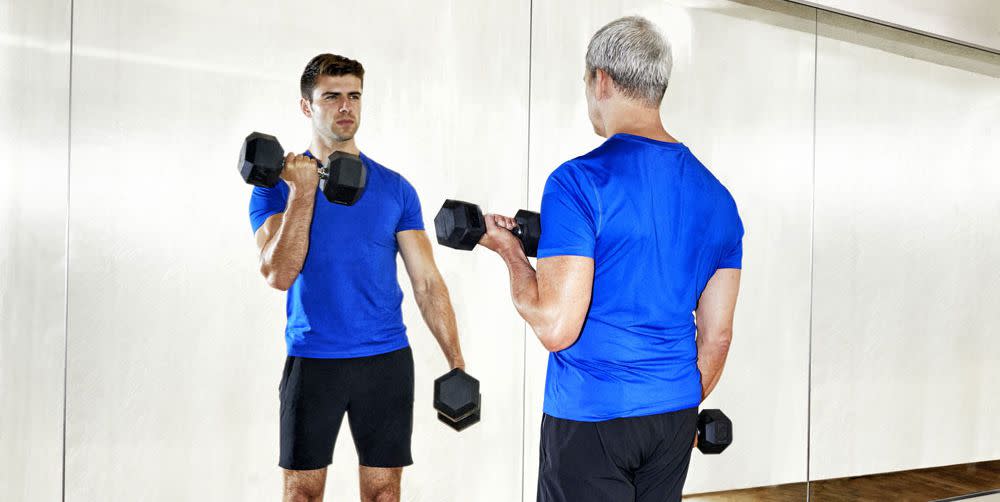Take This Six-Step Test to Find Out Your Real Fitness Age

You know how old you are, legally. No matter how much you might want to deny it, that number won’t change.
But what about your fitness age? That’s a separate measure entirely, one that can rise and fall according to your vital measurements. The term was coined in 2006 by Norwegian Ulrik Wisl?ff, Ph.D., a professor of exercise physiology, who developed an algorithm to tell you how old your body really is (at least according to his standards).
You can check that measure via an algorithm on the World Fitness Level site-or, for a more personal calculation, you can attempt this stripped-down version of the testing our writer Michael Easter went through to find his own true age, developed by Doug Kechijian, D.P.T., and Michael Fredericson, M.D.
[Find 52 weeks of tips and motivation, with space to fill in your mileage and favorite routes, with the Bicycling Training Journal.]
Check Your Fitness Age
Do this six-step workout to assess whether you’re younger or older than your calendar age.
Directions:
Take the first five tests, noting the ages associated with your results. Add those ages and divide by five, then add your mobility test score to find your fitness age. Not happy with the results? Spend extra time each week training in the areas in which you struggled most.
Test 1: VO2 Max/Cardio
Activity: One-Mile Run

Your quest to know your fitness age starts with VO2 max, but who has time for the complicated test our writer took? Not you, so here’s a simpler test to measure your oxygen uptake: Crush a one-mile run, and make sure to record the time. Do this outdoors, if possible.
TEST RESULTS
Time = Age Score
<7:20 = 25; <7:40 = 35; <8:00 = 45; <8:40 = 55; >8:40 = 65
Test 2: Total Strength
Activity: Trap-Bar Deadlift and Farmer’s Walk

Now measure your overall strength and your grip strength. Stand inside a loaded trap bar, grab its handles, and lift. Walk 100 feet without dropping the bar. Don’t have a trap bar? Use heavy dumbbells or kettlebells.
TEST RESULTS
Percent Bodyweight Carried = Age Score
175% = 25; 150% = 35; 125% = 45; 100% = 55; <100% = 65
Test 3: Relative Strength
Activity: Pushups

Total strength is one thing, but how well can you manage your bodyweight? Find out by firing off as many pushups as you can. Note: Your body must remain straight and your chest must touch the floor on each rep.
TEST RESULTS
Total Reps = Age Score
28 = 25; 21 = 35; 16 = 45; 12 = 55; 11 = 65
Test 4: Functional Strength
Activity: Turkish Getup

You have to be able to get up from the ground. Lie with your back on the ground and a kettlebell in your dominant hand, then hoist it overhead. Your challenge: Reach a standing position while keeping the kettlebell overhead at all times.
TEST RESULTS
Max Weight (KG) = Age Score
24 = 25; 20 = 35; 16 = 45; 12 = 55; 0 = 65
Test 5: Coordination
Activity: Single-Leg Jump Rope

Fit people have coordination, which can’t be trained with running and biceps curls. Grab a jump rope and do a couple skips to warm up. Then do as many consecutive single-leg skips as you can. Repeat on your other leg. Your lowest number is your final score.
TEST RESULTS
Consecutive Skips = Age Score
50 = 25; 45 = 35; 35 = 45; 25 = 55; 10 = 65
Test 6: Mobility
Activity: Overhead Squat

The final piece is often the most forgotten. Grab a broomstick and stand with feet shoulder-width apart, toes pointed at a slight angle. Hold the stick directly overhead. To pass, squat to parallel while keeping your arms straight and your feet planted, not leaning your torso forward.
TEST RESULTS
Did you reach parallel?
Yes = -1; No = -3
('You Might Also Like',)